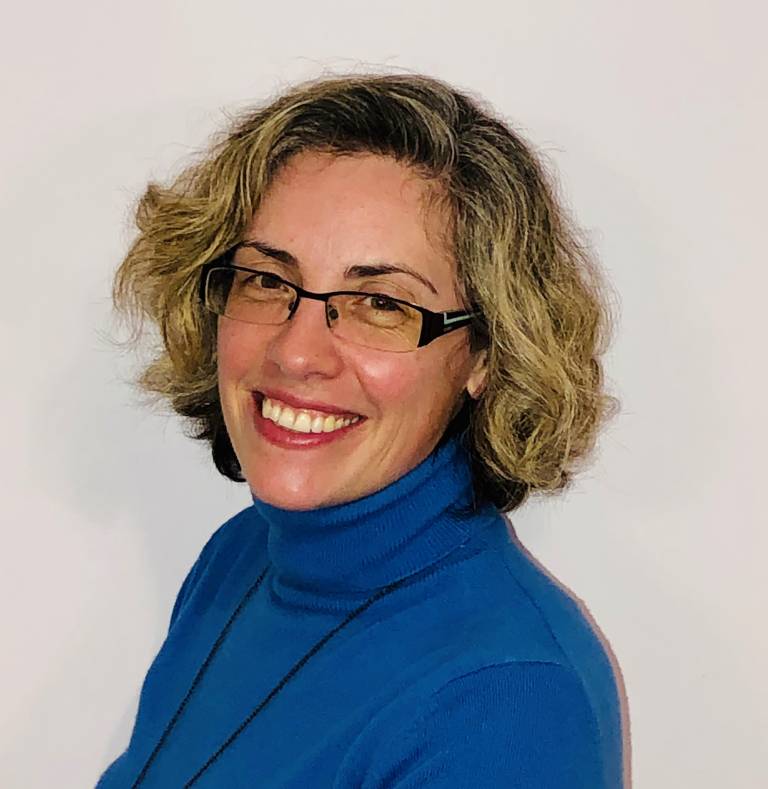Spotlight on our new Digital Deputy Director, Dr Marianna Obrist
8 December 2020
We are delighted to welcome Dr Marianna Obrist to our directorate team, as our new Deputy Director (Digital).

Marianna joined UCL in July 2020 as Professor of Multisensory Interfaces in the UCL Interaction Centre (UCLIC). Prior to this, she was head of the Sussex Computer Human Interaction Lab at the University of Sussex. Her research focuses on how touch, taste and smell can be used in human-computer interaction (HCI).
We spoke to Marianna about her research background and her ambitions for her role at the Institute of Healthcare Engineering.
What would you like to achieve in your new role?
There are three main pillars. The first one is to connect – to connect with people, but also be the connector.
The second one is to bring in new links for the Institute of Healthcare Engineering. The Institute has a very strong profile, but I think I can bring some new connections. For example, my team were just awarded funding for a new interdisciplinary centre by the Royal College of Art, where we are looking at textile circularity. You might not think about textiles and health, but they are part of our bodies and they can affect our we feel about ourselves – which is particularly relevant when it comes to body image perception and eating disorders.
And the third one is to very much foster what my predecessor Professor Ann Blandford began, which is to always bring the user back to the centre of our attention. Is that system considering what the user needs – or are we pushing it because the technology enables us to do it?
Why are the senses of smell and taste so important to our health?
We take them for granted, but there are so many emotions and memories connected to our sense of smell and taste. By bringing together engineering advances with neuroscience and psychology, we can design new systems that take the whole human into account.
Do you know how good your sense of smell is, and how that affects your life? There are fitness apps for running and heart rate, but how do you quantify smell? Humans aren’t static, we change over our lifespan and we adjust for changes in our other senses by getting glasses or hearing aids. But I don’t think anybody has invented a nose or tongue aid yet!
You’ve had a lot of experience in the creative world. Could you tell us a bit more about that?
When I started my research on multisensory experiences, it was hard to convince people that it was meaningful and not just a gimmick. But where we found lots of traction was in the creative industry with artists and content creators who wanted to create more immersive experiences and push boundaries.
So, we did a six-week installation at Tate Britain, called Sensorium, where we augmented art with different sensory elements. Not only could you see art, but you could hear, feel, taste and smell it – creating a new way of looking at art, and expanding the audience.
Last year for British Airways’ 100th anniversary, we created a multisensory virtual reality experience at the Saatchi Gallery, where you could relive the evolution of flying – going back to the trials of Leonardo da Vinci with his flying machine through to the Wright brothers. We created wind and temperature so you’re flying like a bird!
You’ve also worked with NASA to design enjoyable food for astronauts?
Yes, I went to visit NASA and spoke with the astronauts. When it comes to space, people are still busy focusing on the engineering challenges, like ‘how do we actually get humans off the ground into space?,’ but they don’t think about the fact they might be up there for 12 months with five other people. How do we keep them sane and health? This project is about giving that extra element of ‘human-ness’. Health and wellbeing are just as important when we’re thinking beyond the Earth.
Anything else you’d like to say?
Just that I’m very happy to join the team! Everyone is so passionate about what the Institute is doing, and hopefully over the next few years I can live up to this great foundation and add my extra stamp – maybe moving us from Earth to outer space – who knows!
 Close
Close

